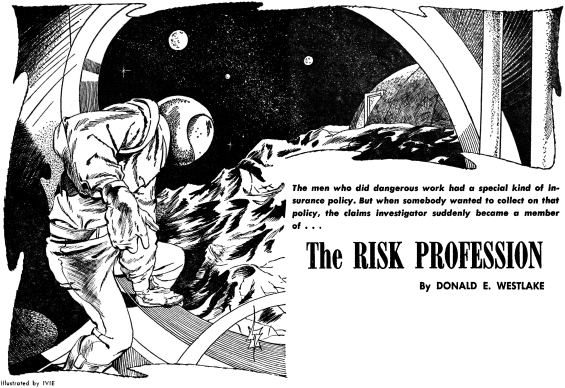
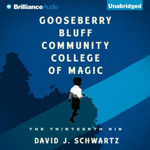 Gooseberry Bluff Community College of Magic: The Thirteenth Rib
Gooseberry Bluff Community College of Magic: The Thirteenth Rib
By David J. Schwartz; Narrated by Janina Edwards
Publisher: Brilliance Audio
Publication Date: 21 October 2013[UNABRIDGED] – 12 hours, 11 minutes
Themes: / urban fantasy / mystery / community college / magic / secret agents /
Publisher summary:
Meet the newest professor at Gooseberry Bluff Community College of Magic, Joy Wilkins. She may suffer from face blindness, but Joy can still recognize people by reading their auras — a skill that comes in particularly handy for her real work as an undercover agent with the Federal Bureau of Magical Affairs. Her mission: to discover the source of weaponized demons being trafficked through the quaint school on the border of Minnesota and Wisconsin, and to locate her predecessor, the school’s missing History of Magic professor. But just as her investigation gets under way, the brutal murder of Joy’s handler — and mentor — sets her on the trail of a secret society known as the Thirteenth Rib. With the clock ticking down to the next attack, Joy will have to find new allies and uncover ancient secrets if she’s going to have any chance of defeating a conspiracy that threatens to destroy the entire world.
Gooseberry Bluff Community College of Magic: The Thirteenth Rib (hereafter referred to as Gooseberry Bluff ) is a book that had a lot of good ideas, but suffered a bit on execution. I was originally attracted to it because it seemed like a cross of modern urban fantasy with mystery–and in many respects, it was just that. The issues I had with it are more about how it wrapped up the various plot lines, and what was left to the imagination.
The premise is simple: Joy Wilkins is the new professor of history at Gooseberry Bluff Community College of Magic (GBCCoM), but she’s also an undercover agent for the Federal Bureau of Magical Affairs (FBMA). Joy’s job as an agent is made somewhat more difficult by the fact that she has face blindness; luckily, she is very good at reading auras, so her disability isn’t the end of the world. Very few people (relatively speaking) are good at reading auras. She is assigned to GBCCoM ostensibly to investigate the disappearance of the previous history professor, Prof. Drake, and to investigate the source of demon trafficking within the school. There are some other side stories in the book, and some character- and world-development that is done through the course of the narrative.
The characters are rather interesting and varied. Schwartz emphasized diversity in his characters, something relatively few authors seem to feel comfortable with, and that’s to his credit. The characters–whether they’re the narrator (Joy, the face-blind African American woman who’s also an agent in the FBMA), Andy (the transgender assistant who is biologically a male but self-identifies and dresses as a female and prefers to be referred to with feminine pronouns), the gay president of the college, the Indian FBMA case handler, or the (apparently stereotypical white male) FBMA case handler, to name a few–are all believable and deeply developed. On the one hand, it felt like Schwartz may have been trying “too hard” to be SO DIVERSE but on the other, the diversity and the character traits opened up by this diversity were well-handled; rarely did it seem like a character was diverse just to be diverse.
The world didn’t need much development in general, given that the book takes place in modern-day “Gooseberry Bluff, MN” (a city on the St. Croix river). The rules for the various types of magic weren’t particularly well-defined, but this book wasn’t as much about the magic as it was about the mystery, so that can be forgiven. When needed, such as when explaining the demon-summoning, the rules were at least internally consistent.
The biggest issue I had with the book is that it had a lot of plot lines, and they weren’t all wrapped up particularly well. In addition, perhaps because of all the parallel plot points, the wrap-up to the main story line felt rushed. Some of the plot lines were:
-The main plot line, Joy trying to solve the disappearance of her predecessor at the school and the demon-trafficking
-Related sub-plots of assassination attempts and trying to determine why Joy’s FBMA case manager is trying to keep her off the job
-The president of GBCCoM’s time away from the school
-A romantic relationship between two other professors at the school
-A student (Margaret) who is very strong, magically-speaking, but very novice
-Another professor at the GBCCoM trying to bring back her sister’s soul
In the end, the main plot line was wrapped up but the sub-plots weren’t particularly discussed. I was left thinking that the case manager is just a jerk (he was certainly painted that way), but a lot of time was devoted to him. The main plot line was wrapped up, though with a lot of things falling into place “at the right moment” or Joy “figuring it out” suddenly at the end. The other plot lines were not specifically wrapped up–in fact, one of them was left wide open (the last one I listed). It seems like Schwartz spent so much time doing the world-building, that by the time he needed to wrap up the story, it felt rushed. I wasn’t exactly sure how Joy connected the dots or what exactly happened.
The narration by Janina Edwards was pretty good. There were a few times when I had to back up my recording and re-listen to a few sentences, but I think that was more attributed to awkward phrasing or unusual words than the actual narration. When I closed my eyes, I could see a confident African American woman as Joy–I actually had the picture of my 7th grade reading teacher in my head (thank you, Mrs. Barrett!). If you’re one who likes to listen at greater than normal speed (1.25x, 1.5x, 2x), you might have a hard time–I did. But the book was short enough that I didn’t mind listening at 1 or 1.25x speed.
It will be interesting to see what (if anything) else Schwartz does with this world. I would like to know how some of the other plot lines wrap up, and why Margaret seemed so “important” in this book. I would hope, though, that in future books, less time is spent on world-building and more time is spent telling the story evenly, so that it doesn’t need to end up rushed as this one did at the end.
Posted by terpkristin.
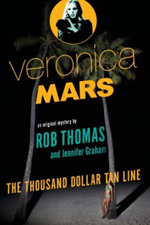 Veronica Mars: The Thousand-Dollar Tan Line (Veronica Mars #1)
Veronica Mars: The Thousand-Dollar Tan Line (Veronica Mars #1)
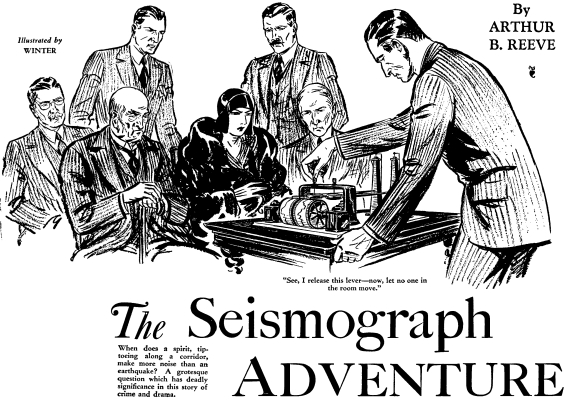
 The Seismograph Adventure
The Seismograph Adventure



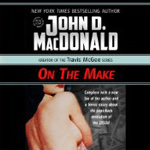 On the Make
On the Make
